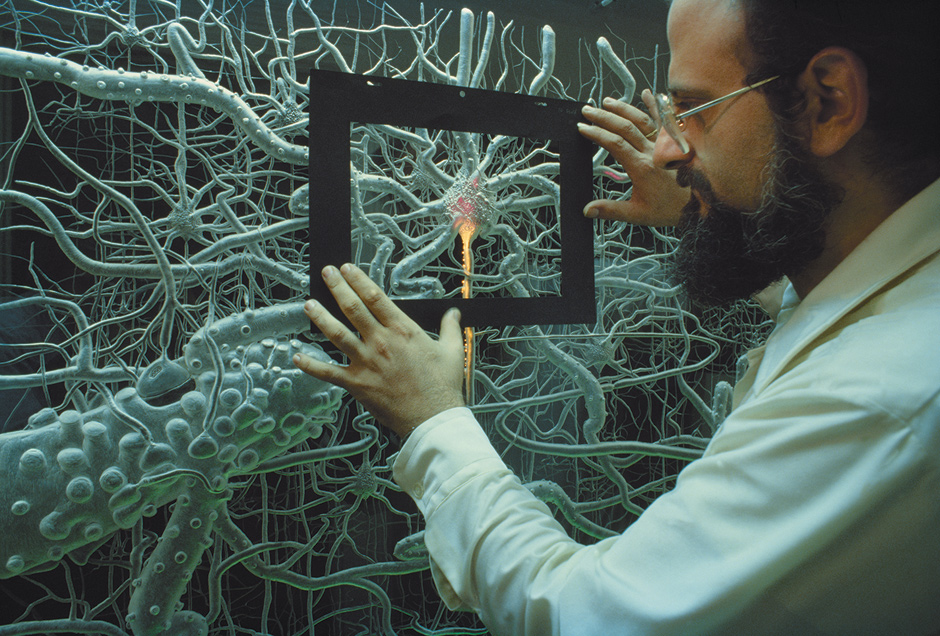Patricia Churchland’s Touching a Nerve belongs to the same genre as a book by Jean-Pierre Changeux that I recently reviewed in these pages1: neuroscience cheerleading, to put it crudely. Churchland is avowedly a big fan of the brain—she loves the brain (as she never tires of reminding us). And her book well conveys her enthusiasm, being generally well written, informative, and readable. She ably covers such topics as near-death experiences, aggression, sex, war, self-control, consciousness, and sleep, among others. If there is anyone left in the world who does not believe that the mind can be minutely controlled by the brain, right down to particular molecules, then this book might disabuse them of such ideas. Churchland presents herself here as a no-nonsense neurophilosopher, impervious to flimflam and all forms of superstition; she believes only in what she can put her hands on and squeeze. It’s the brain, baby, the brain, and nothing but the brain.
It is when she approaches a philosophical issue that the wheels tend to come off the tracks. There is an autobiographical component to this:
I began to learn neuroscience in the mid-1970s after having begun a career in philosophy. This transition was motivated by the realization that if mental processes are actually processes of the brain, then you cannot understand the mind without understanding how the brain works. Studying the brain and thinking about how it works became a joyous obsession. Almost nothing about the brain, from tiny molecules shifting between neurons to the whole nervous system, failed to be fascinating. What is the me in all this—and, for that matter, the we in all this, my husband Paul and I wondered.
In her view, philosophers fail to recognize an elementary truth: that the brain is the basis of mental activity. Once you accept this obvious truth, your reason to stay a philosopher evaporates—you should switch to neuroscience immediately. This is particularly poignant for me, because I switched to philosophy from studying psychology with a heavy neuroscience component (starting in the late 1960s)—did I fail to grasp that the mind depends on the brain?
Two elementary observations are in order. First, not all of philosophy is concerned with the mind: there is also logic, metaphysics, ethics, epistemology, philosophy of physics, etc. Philosophy of mind is just one branch of philosophy, and not everyone in philosophy is particularly interested in it. Second, philosophy of mind is not psychology: it is concerned with more abstract general questions, not the details of perception, memory, and so on. So there is nothing in Churchland’s remark to warrant switching from philosophy to psychology, still less to neuroscience.
But there is a more subtle fallacy in her reasoning here: just because the mind depends on the brain does not prove that psychology is not an autonomous science. Churchland’s reasoning is as unsound as the following bit of invented autobiography: “I began by studying biology, but then I realized that organisms are made of molecules, so I switched to chemistry—this being the only rational course of action.” That declaration can only seem remotely plausible if we assume a very strong form of reductionism, namely that psychology (or biology) can be translated into neurology (or chemistry). Indeed, anyone studying virtually any subject, following Churchland’s logic, should switch immediately to physics, since everything is ultimately made of elementary particles and depends on their activity. Historians should become physicists, as should students of literature, because people and books are made of elementary particles! Churchland herself should abandon neuroscience and take up basic physics, because she must realize that brains are made of matter and physics is the science of matter.
The reason people don’t do these things is that they reject the kind of simple reductionism contained in Churchland’s autobiographical remark. This makes me think that the younger Patricia actually did well to abandon philosophy for neuroscience: she has the ability and interest to do the latter, at least as an amateur, but she seems hopelessly lost when it comes to philosophical issues. It is certainly rational to give up a subject for which you have no natural feeling or aptitude.
Early in her book she describes an unnamed philosopher who exclaimed at a conference, “I hate the brain!” She wonders what he could possibly mean. I asked Jerry Fodor, who is notorious for opposing brain science as a method for doing psychology, whether he was the unnamed exclaimer. He said it certainly sounded like him but he had no recollection of having said anything like that at a conference; then he added, “though it sounds a lot like blaming butterflies for lepidopterists.” That is, it is not the brain he hates but the way certain people talk about it—that is, the claims they make on its behalf. He does not doubt that the brain is the biological organ wholly responsible for the mind, but he rejects the idea that brain science is the right level of analysis at which to formulate psychological theories—as a biologist will reject the idea that chemistry is the right level at which to formulate biological theories.2 Churchland gives not even a hint of an argument in her book that the reductionist position is correct, and the doctrine is highly controversial at best. Nor does she ever confide to us how far she is willing to go in the reductionist direction—all the way down to physics?
Advertisement
Though there is very little philosophy in Touching a Nerve, Churchland does at one point address herself to certain philosophers she calls “naysayers.” Here I must declare an interest, because I am the philosopher cited (along with Noam Chomsky). I have indeed maintained that consciousness is a deep mystery, possibly unsolvable by the human intellect. Churchland asserts that “mysterians” such as myself are committing an elementary logical fallacy:
The naysayer’s inference takes us from ignorance—we are ignorant of the mechanisms for conscious awareness—to knowledge—we know that conscious awareness cannot be explained. This spells trouble…. Inferring knowledge from ignorance is a fallacy, and it is why the ancient Greeks labeled this fallacy an argument from ignorance.
This is garbled as stated, since we clearly can infer some types of knowledge from the existence of ignorance—if we are ignorant, we can know we are ignorant. Her real point is rather that it is a fallacy to infer future ignorance from present ignorance. Of course that is a palpable non sequitur, but how likely is it that Chomsky and I would commit such an elementary logical blunder? It would be as bad as inferring that we will never know the weather in a month’s time from the fact that we don’t know it now.
But we “naysayers” never made any argument of that form: what we argued was that there are specific features of consciousness and specific features of human intelligence that make the latter ill-equipped to understand the former.3 The argument has the same general form as the following: a blind man ignorant of the nature of color will never come to understand what color is (while remaining blind). Or again, a typical human capable of remembering a seven-digit number is incapable of memorizing a thousand-digit number, and always will be, unless cerebrally enhanced. Or, to cite a famous example, our inability to imagine what it is like to be a bat is permanent, since our imagination is constrained by the type of mind that we happen to have. Churchland is perfectly entitled not to be persuaded by these kinds of arguments, but she is not entitled to pretend that their proponents are guilty of the elementary logical error of deducing future ignorance from present ignorance. It all depends on the kind of case we are considering, obviously.
She also misrepresents the mysterian position as claiming that “the brain mechanisms for consciousness can never be found.” On the contrary, I think it is entirely possible that we shall discover what specific brain activities give rise to consciousness—as it might be, high bursts of electrical activity in the central thalamus. What I contend (following a vast philosophical and scientific tradition) is that discovering such brain correlates will not itself tell us how merely electrical activity in biological cells can give rise to conscious awareness—it will not close the “explanatory gap.” Again, Churchland may disagree about the existence of the gap, but she is not entitled to misrepresent the position of those who find the classic mind-problem difficult and profound. What I find strange is that she seems genuinely unable to grasp a problem that has troubled serious thinkers for hundreds if not thousands of years.
In a recent review of a book by Ray Kurzweil, I wrote in these pages that many expositors of neuroscience engage in misguided homunculus talk.4 Changeux and Churchland are no exceptions, with the former writing about “groups of neurons with motor intentions” and the latter telling us that “neurons in the motor cortex made a decision to turn the head in the direction of the sound.” These authors may not be willing to stand by the literal truth of such descriptions, regarding them as merely a façon de parler, but they are ill advised anyway, and should be dropped.
-
1
The Good, the True, and the Beautiful: A Neuronal Approach, translated and revised by Laurence Garey (Yale University Press/Odile Jacob, 2012); see The New York Review, July 11, 2013. ↩
-
2
See Jerry A. Fodor, The Language of Thought (Harvard University Press, 1975), Chapter 1. ↩
-
3
See Colin McGinn, Problems in Philosophy: The Limits of Inquiry (Blackwell, 1993), and Noam Chomsky, Rules and Representations (Columbia University Press, 2005). ↩
-
4
How to Create a Mind: The Secret of Human Thought Revealed (Viking, 2012); see The New York Review, March 21, 2013. ↩



